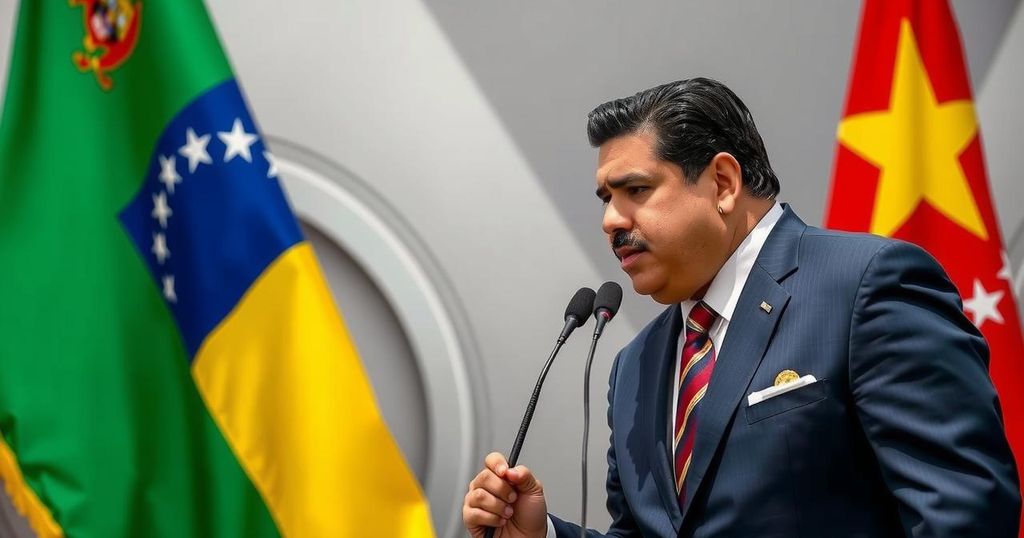SVG PM: Maduro’s Presidency Supports Guyana’s Oil Interests

Dr. Ralph Gonsalves, Prime Minister of Saint Vincent and the Grenadines, advocates for the continued presidency of Nicolas Maduro in Venezuela as beneficial for Guyana’s oil sector. He opposes military aggression from Venezuela, promotes peace through dialogue, and criticizes past U.S. intervention in Latin America. Gonsalves’s comments highlight the need for solidarity and balanced international relations in the Caribbean.
Dr. Ralph Gonsalves, the Prime Minister of Saint Vincent and the Grenadines, recently expressed his belief that the continued presidency of Nicolas Maduro in Venezuela is beneficial for Guyana, particularly for its burgeoning oil sector. During a visit to Guyana to attend the funeral services for the eminent statesman Sir Shridath Ramphal, Gonsalves articulated that the Venezuelan populace’s rejection of the right-wing opposition has been advantageous for the security of Guyana’s developing oil industry. He stated, “If you have a choice between Maduro and the right wing in Venezuela, I advise you to choose Maduro. The right wing will seek to allow the Americans to take the oil in Venezuela, to set up to take over PDVSA (State oil company) and try to run Guyana’s oil industry from Caracas.” Additionally, Gonsalves firmly opposed any military action from Venezuela against Guyana, declaring, “Anytime, if Venezuela attempts to do anything militarily, you’ll hear that I speak against it… Under anybody. No war. You have a problem, you talk about it, you solve it.” His commitment to peace also extends to various international conflicts, as emphasized in his desire for harmony across not only regional borders but also global ones, such as those in the Taiwan Straits and Ukraine. Gonsalves highlighted the supportive role played by Saint Vincent and the Grenadines alongside Brazil in facilitating dialogue between Venezuelan President Maduro and Guyanese President Ali, leading to the signing of the Argyle Declaration for Dialogue and Peace. He further criticized the historical aggressiveness of the right-wing Venezuelan factions towards Guyana, especially regarding the territorial claim over the Essequibo Region. On the topic of electoral fairness, he commented on Venezuela’s elections held on July 28, asserting that they were conducted “on the evidence before me” as fair, contrasting U.S. interference in the elections of other nations over the years. He remarked, “America can’t teach me about elections and democracy. In my lifetime, I watched what has happened.” The political dynamics were underlined by Guyana and Suriname’s joint statement urging a verification of the ballots from Venezuela’s elections, to which Gonsalves responded to criticisms of being anti-American by affirming the quality of his relations with the United States. In conclusion, Gonsalves underscored the importance of mutual understanding and diplomatic resolution over military action, advocating for a stable relationship between Guyana and Venezuela, given the complexities surrounding the oil industry and regional security.
The article discusses the views of Dr. Ralph Gonsalves, the Prime Minister of Saint Vincent and the Grenadines, regarding the geopolitical situation involving Venezuela and Guyana. The backdrop is the ongoing territorial tensions concerning the Essequibo Region, as well as Guyana’s emerging oil sector, which has attracted international interest. The political landscape in Venezuela, particularly under the leadership of Nicolas Maduro and the role of right-wing oppositions, plays a crucial part in Gonsalves’ commentary. His statements also touch upon historical U.S. foreign policy in Latin America, particularly in relation to the Monroe Doctrine, which sought to maintain U.S. influence in the Western Hemisphere.
In summary, Dr. Ralph Gonsalves posits that Nicolas Maduro’s presidency is essential for protecting Guyana’s interests in oil amidst regional security concerns. His stance advocates for peaceful dialogue rather than military confrontation, emphasizing a collaborative approach among Caribbean nations. Gonsalves’ reflections on electoral democracy and U.S. foreign policy further highlight the complexities of regional relationships, advocating for sovereignty and self-determination in the Americas.
Original Source: caribbean.loopnews.com







